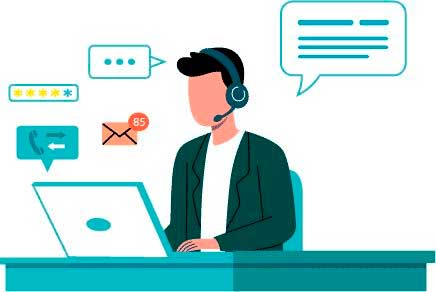How do you say you can answer phones on a resume? It depends on the sphere in which you’ve gained telecommuting skills and the role you’re applying for.
Have you worked as a call center agent for a mobile operator, a customer service representative in an electronics shop, or as a receptionist in a physician’s office? Check how to add this experience to your resume and boost your CV.
How do you put telephone skills on a resume?

Specialists dealing with phone answering have plenty of competencies that support this skill. They provide information about services or products and help clients resolve issues. Adding data to customer accounts in CRM systems and forwarding incidents is also among their responsibilities.
You can describe this experience by adding bullet points to any CV section: Summary, Career Overview, Skills, or Additional Information. However, it’s essential to highlight key points to help your potential employer quickly notice your strengths.
So, one of the professional ways to say you know how to answer phones on a resume is to state
The number of calls per shift or hour
The quantity of phone call queries from customers seeking help varies from company to company. It depends on the organization’s size, number of customers, product, season, and other factors.
You can mention how many monthly conversations your call center processes to show its load. However, stating the number of calls you can take up and close hourly or per shift will highlight your effectiveness.
It proves you can quickly find the necessary data in the system, help customers, or forward the call to another agent. Add this information as a bullet point when describing your achievements in the previous role(s).
Customer satisfaction rate consistency or growth

Customer satisfaction (CSAT) is essential for business success. Many callers would turn to competitors after experiencing poor customer service.
So, if you help clients fast and in a friendly manner, this might increase your call center’s CSAT score or keep it the same for a certain period. Add this percentage to your achievements.
It’ll stress your value to potential employers and characterize you as a well-communicating, attentive-to-detail, creative, and flexible professional. Moreover, an improved CSAT means turning unhappy callers into happy customers — a much-needed contribution.
Running training for new colleagues
Empathy and the ability to listen to customers are essential for a call center agent. However, enriching these skills with knowledge about the product/service and mastering technologies are also critical.
And the faster a newcomer dives into work, the better it is for the business. So, hiring a professional call center agent who can level up juniors is advantageous.
That’s why you must stress your value for the business and write about specialists you’ve trained. Include numbers, for instance, how many agents you coached, how much time it took, and what results they achieved.
Get more tips on how to say you’ve trained new employees on a resume.
Incentives that helped the business

The audience addressing call centers changes with time, and so should the approaches to it. Since customer service representatives (CSR) directly communicate with buyers, they’re the first to know how to do that more effectively. And those who come out with ideas on improving this interaction are precious.
Did you offer adjusting responses or adding new scenarios to script guides that decreased call time? Did you motivate your team to use a feature or even a new tool that boosted query procession?
If so, add this experience to your job accomplishments with examples and proofs of how it worked. This way, you’ll show your involvement in business success and workflow improvement.
Tools you’re familiar with
Advanced software allows customer service representatives and other call-receiving specialists to be more efficient. So, ticketing systems are vital to the call agent’s performance.
This way, knowing the industry’s top tools for managing customer queries is your competitive advantage. Mention the familiarity with messengers, knowledge bases, dashboards, and automation tools related to your phone-answering experience.
Add a few bullets to the Skills section naming Salesforce, Zendesk, Tidio, Bitrix24, Zoho, Jira, LiveAgent, or other tools you used. Such competencies will motivate employers to choose you for building an enjoyable customer experience.
Skills that support your telephone answering efficiency

Good memory
The working rhythm and specifics of a call center require remembering a lot of information from its agents. A qualified receptionist or a CSR keeps in mind product features, software functionality, and conversation scripts.
Also, call-answering specialists regularly access client databases, navigate dashboards, and add data to CRMs. So, if you actively use your memory for performing phone-answering tasks, state it.
However, avoid writing “excellent memory.” Instead, include more neutral phrases like “fast learner,” “good at remembering texts and action sequences,” and “can memorize large amounts of data.”
Typing speed
Answering inbound calls is closely tied to the ability to register callers’ data and search for the necessary information through typing. So, the more words per minute (WPM) you can deliver, the faster you can process phone queries.
That’s why future employers would consider your typing speed for the positions of a receptionist or a call center agent. The good result is 60-65 WPM.
However, for roles like an administrative assistant or a legal advisor’s secretary, you may need to type at 100 WPM. So, state your typing speed in the Skills or Additional Information section.
Stress tolerance
Answering phones is stressful work that often leads to burnout. Unfortunately, the turnover rate in call centers is pretty high, while employers are interested in long-term cooperation. So show them your readiness for such a commitment.
Still, mentioning stress tolerance as one of your soft skills will be just a line in your CV that other applicants might also add. Though, in a resume, you can’t get into details on how you handle stress, you can tell your interviewer about them.
Do you make regular breaks, use breathing techniques, or get distracted with your favorite playlist? Or maybe you relax well after a good meditation or mindfulness exercise? Describe just a few.
Wrapping up
Writing in a resume that you can answer phones will look more professional if supported by several statements. You can mention the number of processed calls per shift, the software you used, and your incentives and training experience.
Also, your memory, typing speed, and stress tolerance can help you perform call-answering tasks faster and more effectively. So, make sure to add all the critical elements to your CV to make it appealing to recruiters.

